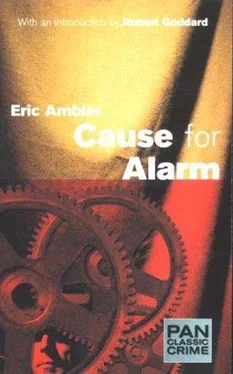Eric Ambler - Cause for Alarm
Здесь есть возможность читать онлайн «Eric Ambler - Cause for Alarm» весь текст электронной книги совершенно бесплатно (целиком полную версию без сокращений). В некоторых случаях можно слушать аудио, скачать через торрент в формате fb2 и присутствует краткое содержание. Жанр: Криминальный детектив, на английском языке. Описание произведения, (предисловие) а так же отзывы посетителей доступны на портале библиотеки ЛибКат.
- Название:Cause for Alarm
- Автор:
- Жанр:
- Год:неизвестен
- ISBN:нет данных
- Рейтинг книги:3 / 5. Голосов: 1
-
Избранное:Добавить в избранное
- Отзывы:
-
Ваша оценка:
- 60
- 1
- 2
- 3
- 4
- 5
Cause for Alarm: краткое содержание, описание и аннотация
Предлагаем к чтению аннотацию, описание, краткое содержание или предисловие (зависит от того, что написал сам автор книги «Cause for Alarm»). Если вы не нашли необходимую информацию о книге — напишите в комментариях, мы постараемся отыскать её.
Cause for Alarm — читать онлайн бесплатно полную книгу (весь текст) целиком
Ниже представлен текст книги, разбитый по страницам. Система сохранения места последней прочитанной страницы, позволяет с удобством читать онлайн бесплатно книгу «Cause for Alarm», без необходимости каждый раз заново искать на чём Вы остановились. Поставьте закладку, и сможете в любой момент перейти на страницу, на которой закончили чтение.
Интервал:
Закладка:
The only extra-office contact I’ve made so far was with an American, whose name I don’t know, but who has an office on the floor below us. He is an odd-looking blighter with a large, pugnacious nose like a prize-fighter’s, brown, curly hair that stands up at an angle of forty-five from his forehead, surprisingly blue eyes, and a pair of shoulders that look all the heftier because he’s slightly shorter than I am. Sorry to be so pernickety about what he looks like, but he impressed me rather. We met on the stairs this morning. He stopped me and asked if I wasn’t English. He explained that it was my clothes that had given him the idea. We made a vague arrangement to have a drink together some time. He says he knew Ferning.
If I had known just how much of an impression this “American” was going to make on me in the very near future, I doubt very much whether I should have dismissed him quite so easily from my thoughts. But I was feeling very tired. I decided to finish.
Well, darling, I’m going to stop this letter-writing now. It’s too long, anyway, and, even though it’s only nine o’clock, I can hardly keep my eyes open. I haven’t said any of the things I meant to say and very little of what I’m really thinking-about you and me, I mean. Possibly you can guess all that. I hope so, because, with all this replanting of roots going on, all I seem to be able to get down on paper is something between an inter-departmental memo and a particularly dull book of memoirs. I shall go now and soak myself in a hot bath and then go to bed. Good night, and a sweet sleep to you, darling. Write to me as soon as you can. I keep consoling myself with the thought that you’ll be coming here for your summer vacation, but it’s a terribly long time to wait. Let me know as soon as may be when it will be. Bless you.
Nicky.
I looked it through. It took up six sides of the hotel note-paper. Far too long and far too plaintive. Still, it was the best I could do under the circumstances and Claire would understand.
I had stuck down and addressed the envelope when I remembered that I had meant to add a postscript. There were no more envelopes in the rack. Then I did something which I was to remember later. I turned the letter over and wrote the postscript across the back of the envelope.
P.S.-Do you mind sending me a copy of Engineering each week? We get it here but not until Fitch has finished with it. Love. N.
That was that. I would post it in the morning. I yawned and wondered whether to turn the bath on straight away or smoke a final cigarette.
The question was decided for me. The telephone by the bed rang sharply and the voice of the reception clerk informed me that a signor Vagas was asking to see me.
My first impulse was to say that I was in bed and unable to see anyone. I did not know a signor Vagas, I had never heard of a signor Vagas and I was feeling too tired to do anything about it now. But I hesitated. The fact that I personally did not know the name of Vagas was beside the point. I knew nobody in Milan. The man might conceivably be an important buyer, a Spartacus customer. I ought not to take any risks. I ought to see him. The name did not sound particularly Italianate, but that was beside the point. I certainly ought to see him. What on earth could he want? With a sigh, I told the clerk to send him up.
I have wondered since what would have happened subsequently if I had yielded to my aching desire for a hot bath and refused to see him. Probably he would have called again. Possibly, on the other hand, he might have made other arrangements. I don’t really know enough about what went on behind the scenes to say. In any case, such speculations are unprofitable. My only reason for raising the point is that it seems to me that a state of society in which such trivialities as the desire of one insignificant engineer for a hot bath are capable of influencing the destinies of large numbers of his fellow-creatures, has something radically wrong with it. However, I did postpone my bath and I did see General Vagas. But if I had known then what the consequences of that piece of self-denial were going to be, I should, I am afraid, have been inclined to let my fellow-creatures go hang.
He was a tall, heavy man with sleek, thinning grey hair, a brown, puffy complexion and thick, tight lips. Fixed firmly in the flesh around his left eye was a rimless monocle without a cord to it. He wore a thick and expensive-looking black ulster and carried a dark-blue slouch hat. In his other hand he held a malacca stick.
His lips twisted, with what was evidently intended to be a polite smile. But the smile did not reach his eyes. Dark and small and cautious, they flickered appraisingly from my head to my feet. Almost instinctively my own eyes dropped to the stick in his hand, to his fat, delicate fingers holding it loosely about a third of the way down. For a minute fraction of a second we stood there facing one another. Then he spoke.
“Signor Marlow?” His voice was soft and husky. He coughed a little after he had said it.
“Yes, signor Vagas, I believe? Fortunatissimo.”
The small eyes surveyed my own. Slowly he drew a card from his pocket and presented it to me. I glanced at it. On it was printed: “ Maggiore Generale F. L. VAGAS,” and an address in the Corso di Porta Nuova.
“I beg your pardon, General. The clerk did not give me your name correctly.”
“It is quite unimportant, Signore. Do not concern yourself, I beg you.”
We shook hands. I ushered him in. He walked with a slight limp over to a chair and put his coat, hat and stick carefully on it.
“A drink, General?”
He nodded graciously. “Thank you. I will take cognac.”
I rang the bell for the waiter.
“A chair?”
“Thank you.” He sat down.
“A cigarette?”
He looked carefully at the contents of my case.
“English?”
“Yes.”
“Good, then I will smoke one.”
I gave him a match and waited. His eyes wandered for a moment or two round the room, then they returned to me. He adjusted the monocle carefully, as if to see me better. Then, to my surprise, he began to speak in tolerably accurate English.
“I expect, Mr. Marlow, you are wondering who I am and why I have come here to visit you.”
I murmured something about it being, in any case, a pleasure. He smiled. I found myself hoping that he would not consider it necessary to do so a third time. It was a grimace rather than a smile. Now that I knew him to be a General it was easier to sum him up. He would look better in uniform. The limp? Probably a war wound. And yet there was a quality of effeminacy about the way he spoke, the way he moved his hands, that lent a touch of the grotesque to the rest of him. Then I noticed with a shock that the patches of colour just below his cheekbones were rouge. I could see, too, on the jaw line just below his ear the edge of a heavy and clumsily applied maquillage. Almost at the same moment as I made the discovery he turned slightly in his chair. In the ordinary way I should have seen nothing in the movement but a desire for greater comfort; now I knew that he was avoiding the light.
In answer to my polite disclaimer he shrugged.
“How odd it is, Mr. Marlow. We on the Continent spend half our lives in the belief that all Englishmen are boors. And yet, in truth, how much more polite and sympathetic they are.” He coughed gently. “But I must not take up too much of your time. I come, so to speak, in a spirit of friendliness and to give myself the pleasure of meeting you.” He paused. “I was a friend, a great friend, of Mr. Ferning.”
I said “Oh” rather foolishly and then expressed my sympathy.
He inclined his head. “His death was a great tragedy for me. Poor man. Italian drivers are abominable.” It was said smoothly, easily and entirely without conviction. Fortunately, the arrival of the waiter made it unnecessary for me to reply to this. I ordered the drinks and lit a cigarette.
Читать дальшеИнтервал:
Закладка:
Похожие книги на «Cause for Alarm»
Представляем Вашему вниманию похожие книги на «Cause for Alarm» списком для выбора. Мы отобрали схожую по названию и смыслу литературу в надежде предоставить читателям больше вариантов отыскать новые, интересные, ещё непрочитанные произведения.
Обсуждение, отзывы о книге «Cause for Alarm» и просто собственные мнения читателей. Оставьте ваши комментарии, напишите, что Вы думаете о произведении, его смысле или главных героях. Укажите что конкретно понравилось, а что нет, и почему Вы так считаете.












